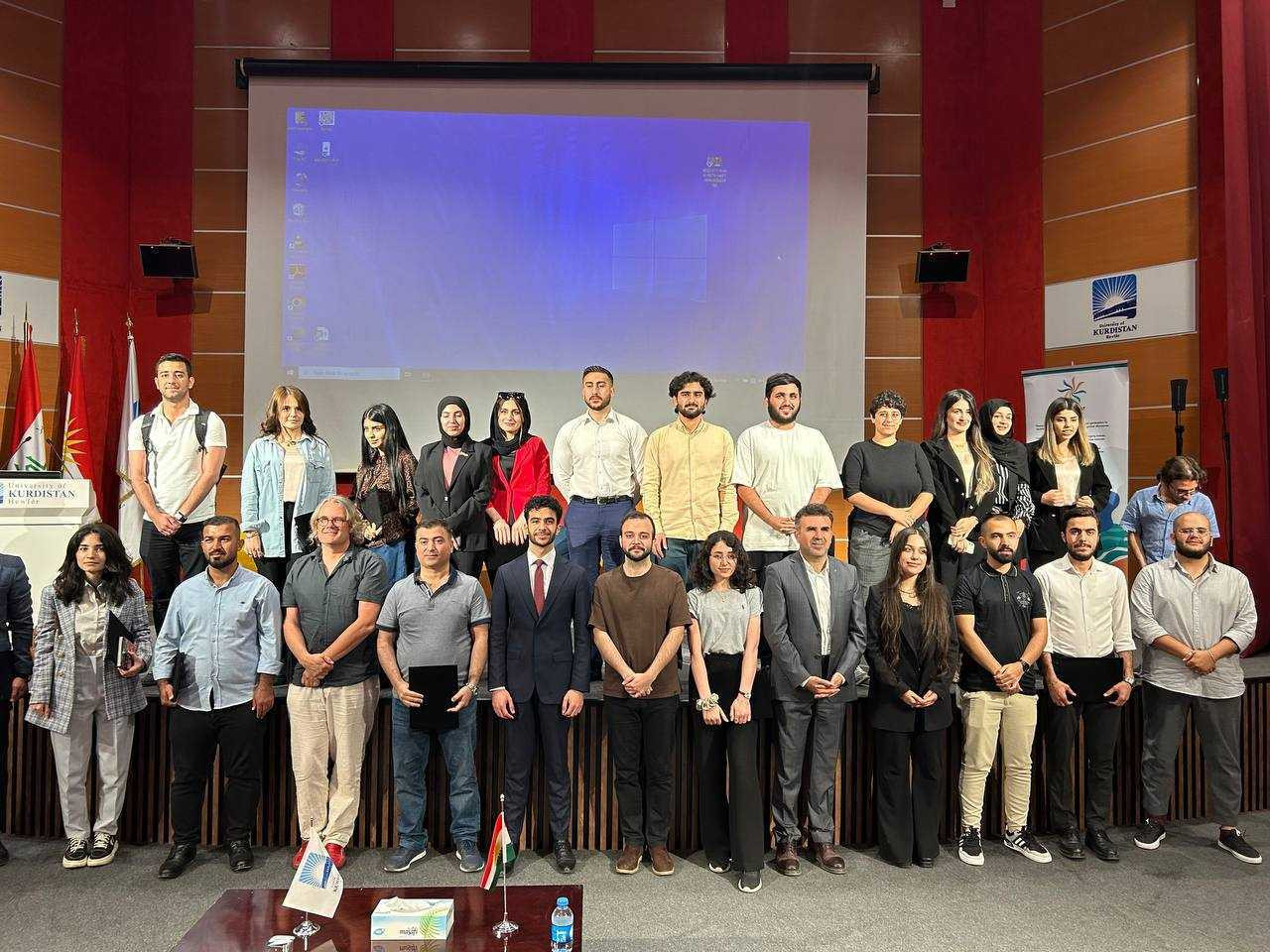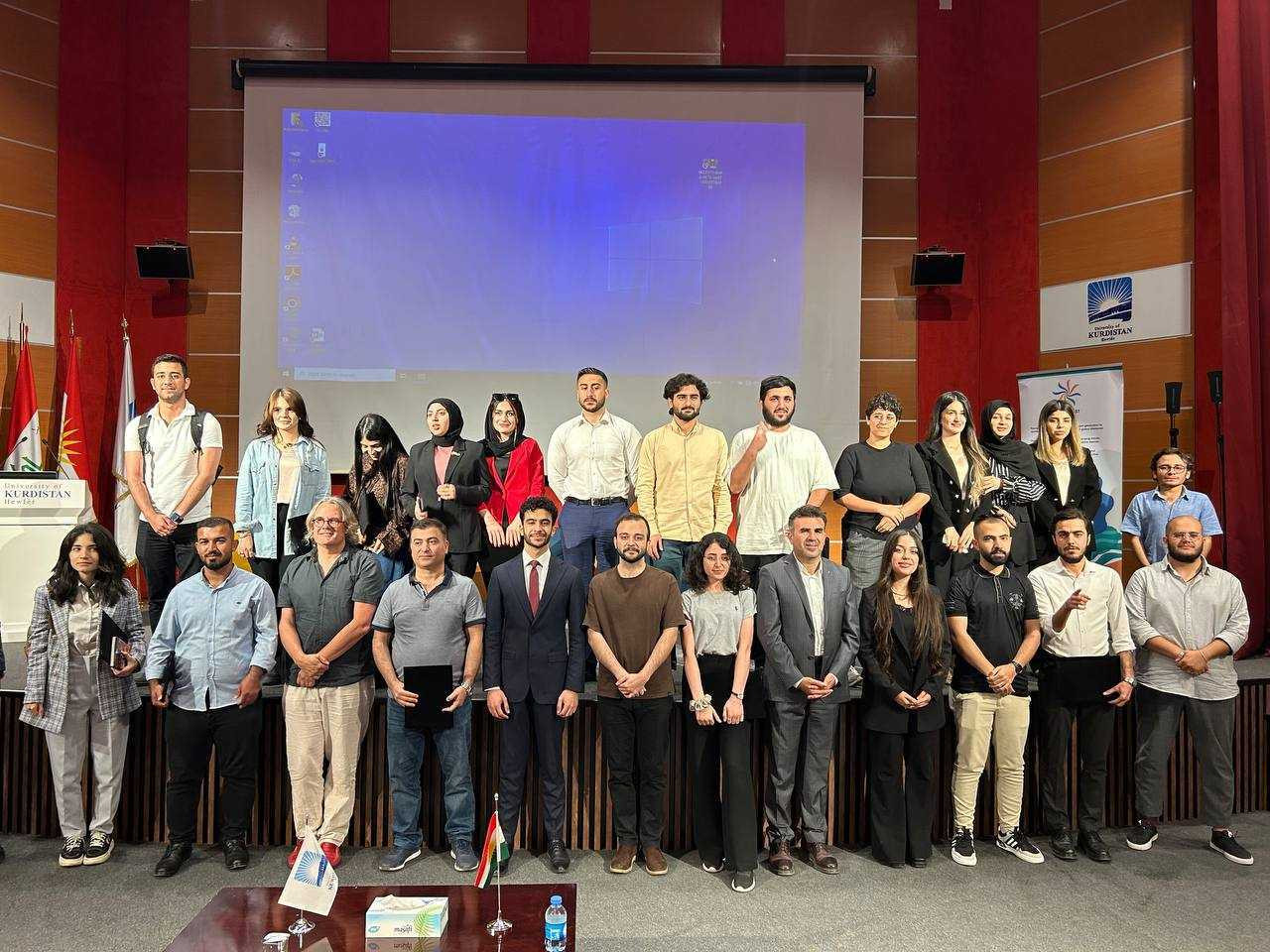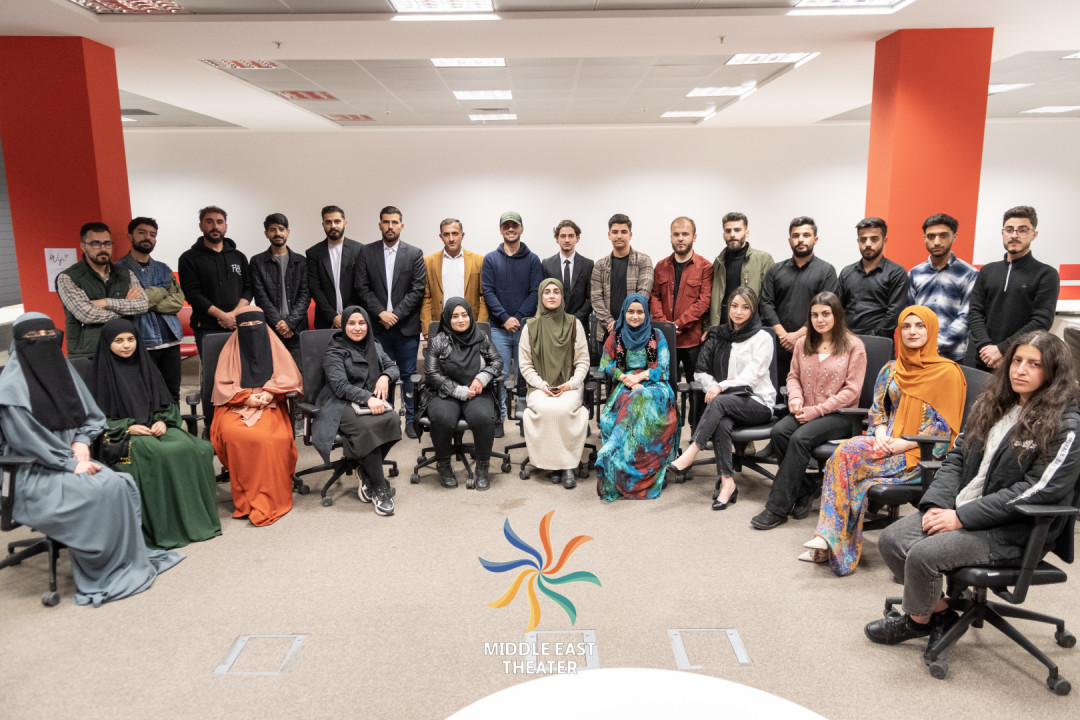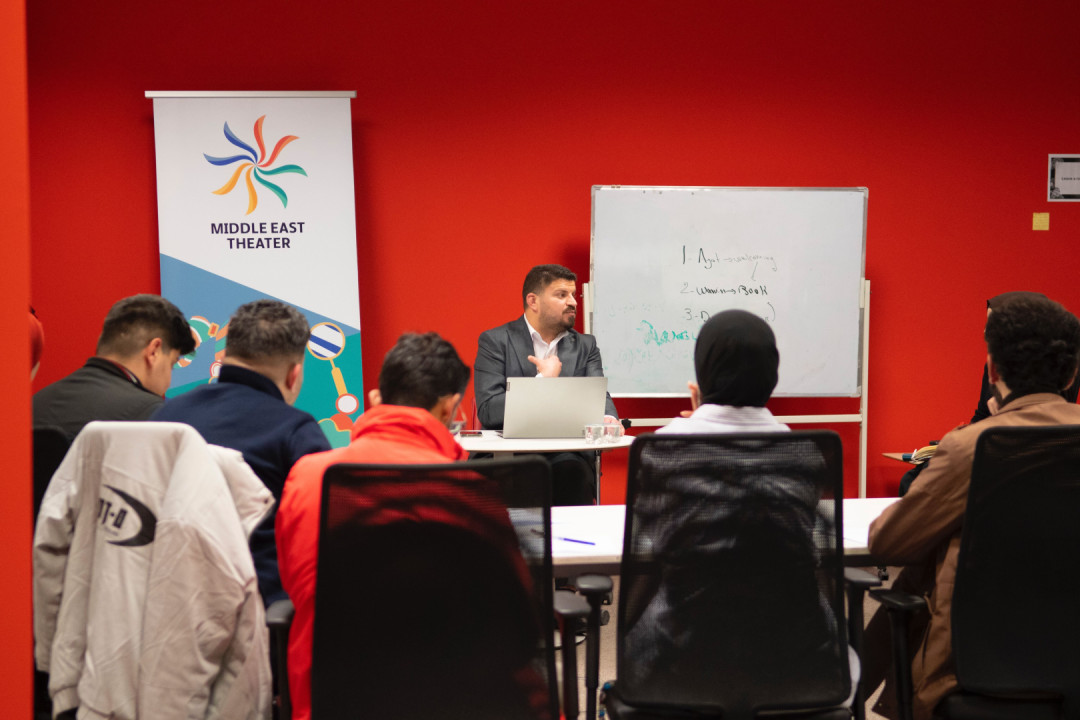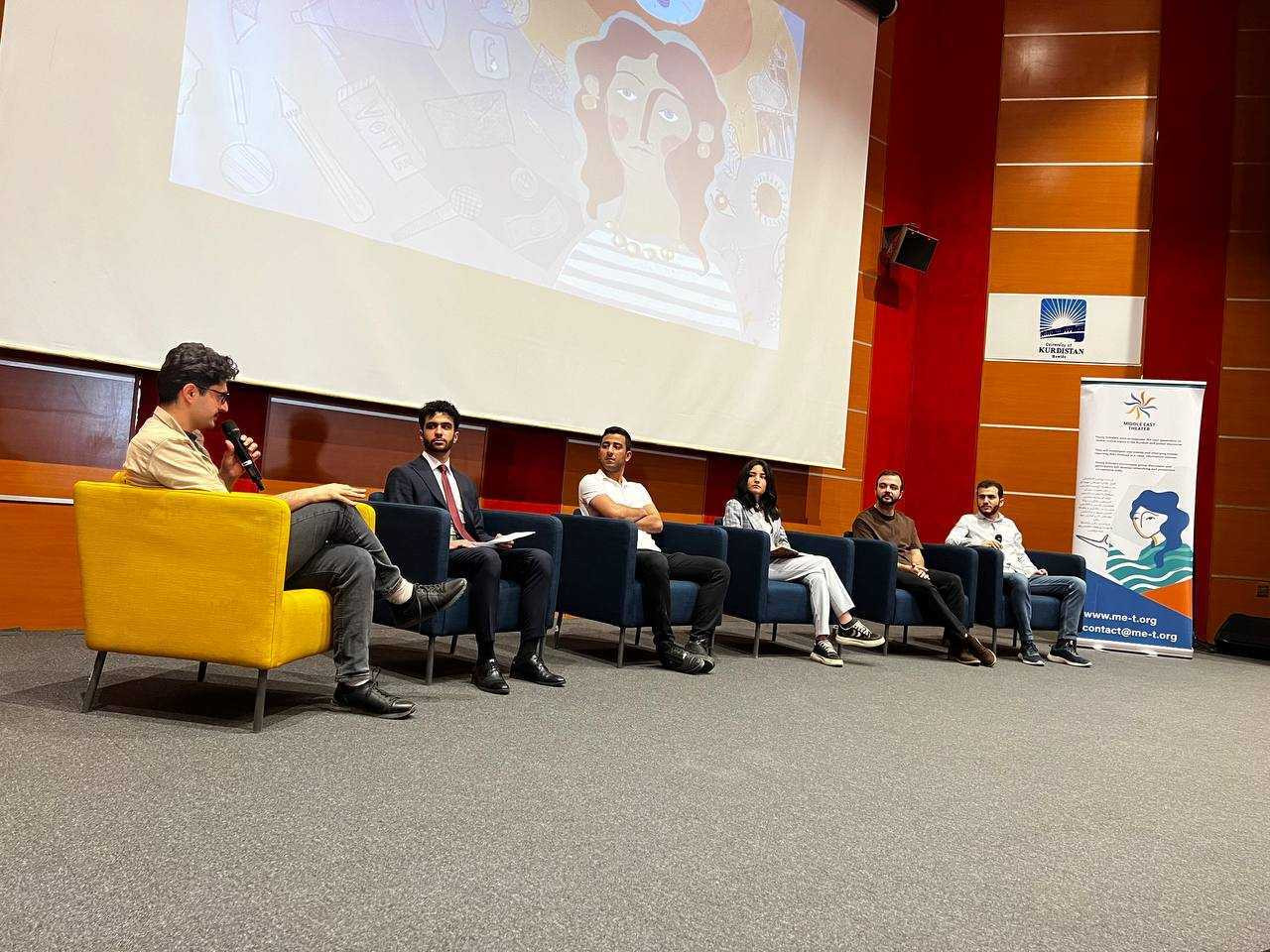
The Closing Ceremony of Young Scholars, It’s Origins, and Impacts
By: Birhat AtrushiIntroduction/Abstract:
The young scholar program, aiming to provide our youth with solid and concrete steps to ensure a future in journalism and research, has given itself the serious task to close its wonderful workshop through an eyewitnessing ceremony in the city of Erbil.
In this ceremony, the young scholars, composed of many from the cities of Duhok, Sulaymaniyah, and Erbil itself, represented their communities, writings, and concepts and were accompanied with the ME-T team alongside the instructor of the project, Dr. Thomas Schmidinger.
Other special visitors were Dr. Bayar Mustafa, the executive manager of ME-T, and various other people representing their sides.
What is ME-T?
ME-T stands for Middle East Theater, combining both a region with intense and almost unavoidable events, and an opportunity. This time, to directly communicate with your peers, your people, and those of your age, mainly other young and enthusiastic writers, researchers and beyond, creating a sensible and feasible environment to work on the betterment of your region. Hence, a theater, to stand not only to bring about a message, but to see everything, everyone, in the middle east.
One of the ways that we do this is through the young scholar program, which provides young people with online and in real life sessions on various academic and research based topics through the prospect of journalism and writing.
It does so by providing workshops, seminars, panels, and an opportunity to publish one's own pieces of writing on the website of ME-T.
Workshop
It was during the workshops that the participants, known as young scholars, discussed for the first time about their motivation to write in the first place. And it happened while they were under the instruction and care of Dr. Thomas Schmidniger.
Dr. Thomas Shcmidinger hails from Austria. And as a visiting professor, he has a profound interest in the middle east and the youth. His interests lie in politics, anthropology, and societal issues lead him to become part of the young scholar program.
One of the ways that the workshop takes place is by giving a session once every week for a period of 6 weeks including the field trip at the end. In this timespan, young scholars write examples of their work, discuss them with their cohort, and present solutions for the very problem they are suggesting. In this way, they attempt to define broad social tensions from their perspective.
It was quite amazing to see the context of each and every written piece. From environment, nature, sociology, philosophy, history, you'd see an emerging pattern that being opinionated on broad, complex topics that need a lot of studying, is something that happens to exist and for us, it showed itself through journalism.
The first cohort took place in Duhok. About 25 participants showed up. Eager to learn and utilize the provided materials, they accompanied several others into exploring major topics. From the importance of the environment, Kurdish culture, leadership history, and most importantly, the visit of the Shindukha neighborhood in the city of Duhok by the young scholars.
One of the most important topics that was selected from this workshop was the history of the Jewish population in Shindukha.
For them, this topic represented a very deep and profound impact on the historical and cultural representation of various groups of people in a geographic entity.
The second cohort was from Erbil who were comprised of 8 members present and they focused on the two historic neighborhoods of Tajeel and Khanqa. The cohort focused on the history and development of the region of Tajeel and Khanqa and its identity throughout the ages. From the name, the people groups, the workforce, and policies that regulate and preserve the identity of these areas.
They were eager to mention precise issues surrounding the life of the locals living there, and the means to fix and become part of the larger extended effort to renovate, supply, and support the area.
In the Middle East, Religious tolerance and the idea of coexistence have always been a matter of discourse and promoted by many areas all across the world.
The role of individuals and the many different religious groups in promoting diversity and dialogue was an important discussion amongst the Sulaymaniyah cohort.
The 10 members were focusing on pointing out historical and archeological evidence of prominent buildings and areas throughout Sulaymaniyah.
This task went beyond the historic city as well and had the city of Halabcha as an example too. For instance, the Jewish quarters in the city of Halabcha were greatly touched upon Their focus was directed toward history and landmarks, and putting efforts to represent the distinct cultural and religious diversity of Sulaymaniyah even within the major religions, often citing creeds and denominations as part of it.
Field Trip:
Middle East Theater (ME-T) recently organized an outstanding field trip for the young scholars, culminating in a big closing celebration at Kurdistan Hewler University (UKH) in Erbil. The ME-T team went above and beyond in precisely organizing and carrying out this incredible adventure. It was a historic occasion for scholars from Duhok and Slemani to gather together and go on a journey to Erbil. The journey itself was full with breathtaking vistas and instructive activities, allowing the scholars to immerse themselves in the region's rich cultural history. As they approached the prestigious University of UKH, the anticipation for the closing ceremony was palpable. It was a celebration of the scholars' dedication, perseverance, and creativity, and growth. The ME-T team's commitment and efforts in organizing this amazing field trip will live on in the hearts and thoughts of everybody who took part.
The Panels
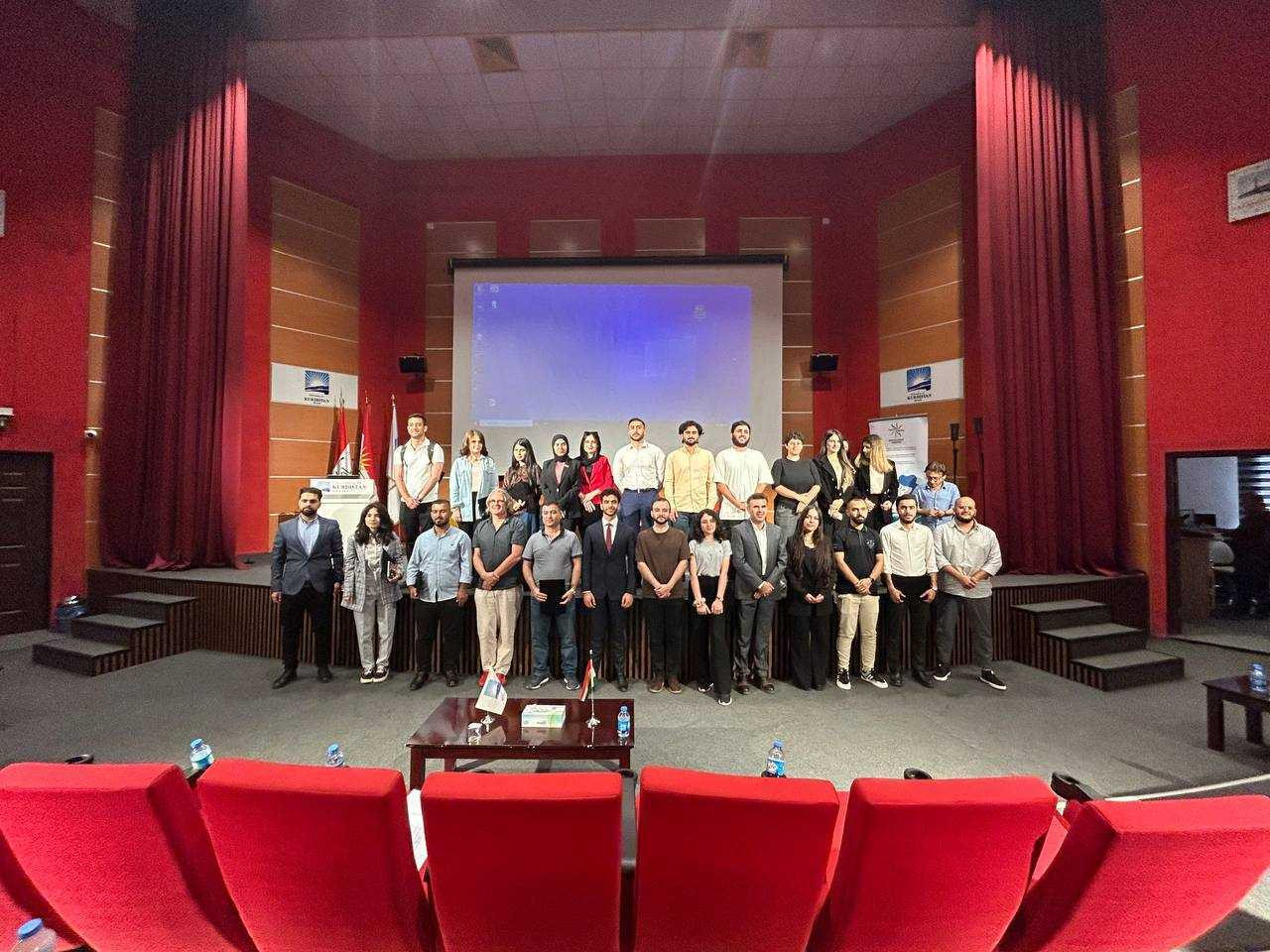
Duhok:
During the closing ceremony of the young scholars program in the Middle East Theater, the Duhok cohort held a panel discussion on the jewish people in Shindukha.They explored the origins of their names, their interactions with locals, and their economic contributions.
They highlighted the integration of the jewish community with the wider society, displaying examples of interfaith collaboration and coexistence. The jewish people in shindukha played a significant role in trade, artisanship, and agriculture, contributing to the local economy.
Their pursuit in cultural and religious studies also affected shindukha’s progress. The panel discussion provided a comprehensive understanding of the jewish community's history and its positive influence on shindukha. It concluded the young scholars program on a note of appreciation for cultural diversity and dialogue.
Erbil:
The Erbil Cohort held a panel discussion of Erbil’s Tajeel and Khanqa districts. They examined the economic and social challenges, government involvement, and the role of bricklayers.
They discussed migration to the area, interactions with locals, and the need for government support in rebuilding the economy.
The panelists highlighted the historical migration to Tajeel and Khanqa, shaping the diverse cultural fabric of the neighborhoods.
They emphasized the peaceful coexistence between residents of Tajeel, Khanqa, and neighboring communities, promoting unity and cultural exchange. The panelists also addressed the economic challenges faced by the districts and emphasized the importance of government assistance, particularly in supporting bricklayers who contribute to reconstruction efforts.
The Erbil cohort's insights shed light on the migration, community interactions, and economic revival of Tajeel and Khanqa. Their observations underscored the significance of government support and inclusive urban development, concluding the Young Scholar Program with a focus on resilient communities.
Sulaymaniyah:
The Sulaymaniyah cohort held a panel discussion during the Young Scholar Program's closing ceremony in the Middle East Theater. Their topic was the religious diversity and history of Sulaymaniyah. They emphasized the role of interfaith dialogue and made separate points on practicing and learning about religions, the interaction with an old church named after Mary, and the Jewish quarter in Halabja.
The panelists stressed the significance of practicing and learning about different religions in Sulaymaniyah, promoting understanding and harmony among the community.
They discussed the interaction with an old church named after Mary, which symbolized unity and cultural exchange in Sulaymaniyah.
The panelists also acknowledged the Jewish quarter in Halabja, highlighting its historical importance and contribution to the region's religious diversity.
The Sulaymaniyah cohort's insights celebrated religious diversity and emphasized the importance of interfaith dialogue in creating a harmonious society. The discussion served as a reminder of the city's cultural richness and inclusivity.
Number of articles written.
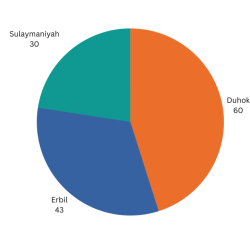
Number of participants.

